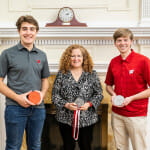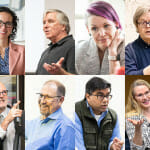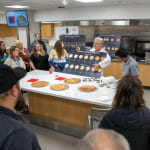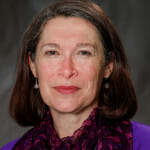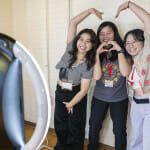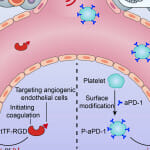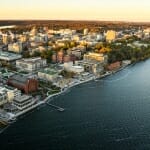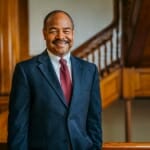Campus news Latest News
Two UW–Madison students awarded prestigious 2023 Goldwater Scholarships
Yi Won (Paul) Chung and Carl Shirley have received the prestigious scholarship for their achievements in computer science and molecular biology. Read More
Reesor: Sharing sad news
The message below from Vice Chancellor for Student Affairs Lori Reesor was sent to all UW–Madison students on April 8. It includes information about a… Read More
Engineering students create medallion for chancellor’s investiture
Mechanical Engineering undergraduate students Teekay Kowalewski (left) and Dylan Zinkgraf (right) present Chancellor Jennifer L. Mnookin with a larger-scale, recast version of the University… Read More
New atomic-scale understanding of catalysis could unlock massive energy savings
Catalyst materials are critical for refining petroleum products and for manufacturing pharmaceuticals, plastics, food additives, fertilizers, green fuels, industrial chemicals and much more. Read More
Science Journalist in Residence meets UW’s creatures
Last week, in addition to visiting students in classrooms and sharing their passion for writing about creatures in a public panel, science journalist Sabrina Imbler visited several labs across UW–Madison to meet researchers and critters alike. Read More
UW–Madison celebrates completion of new and improved Babcock Hall
The modernized plant is also joined by a new, three-story addition for the Center for Dairy Research, a world-class resource for dairy processors and entrepreneurs. Read More
UW–Madison is part of new national effort to increase college access for rural, small-town students
Small Town and Rural Students (STARS) College Network will build on existing recruiting efforts and create new pathways for students who might not otherwise recognize the full range of educational options available to them. Read More
UW–Madison International Division dean named
Her experience includes developing and leading study abroad programs, increasing the number of international students supported through university fellowships. Read More
Five health tech startups you should know
As these early-stage companies continue to grow, they’re creating high-paying scientific and professional jobs in Wisconsin. They’re also contributing to the state’s economy by attracting venture capital investment and other funding. Read More
APIDA festival offers fun in many flavors
Students enjoyed everything from a community weaving loom to trivia questions to making bookmarks at the Asian Pacific Islander Desi American Heritage Festival on April 1, held at the Multicultural Student Center in the Red Gym. Read More
Regents approve 4% tuition increase
The decision by the UW System Board of Regents marks the the first increase in in-state tuition since 2012. Read More
Final candidates for provost to visit campus April 3-7
Members of the UW community are invited to attend candidate presentations and provide feedback to the search committee. Read More
UW–Madison Ranked in Top 500 America’s Best Large Employers for 2023
UW–Madison came in at #196 on the list of employers with at least 5,000 employees. Eight large employers with headquarters in the state of Wisconsin were recognized in the rankings. Read More
Come to the chancellor’s recognition event for second- and third-shift employees
Second- and third-shift UW–Madison employees are encouraged to join Chancellor Mnookin, Bucky, and the UW Band for a spirited reception as part of the investiture celebration. Read More




